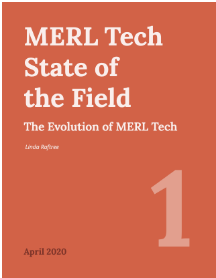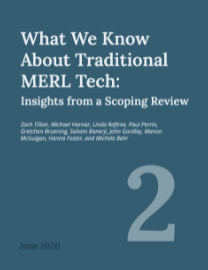Modified from the original, posted on the MERL Tech Blog, July 20, 2020
For the past six years, I’ve been organizing the MERL Tech conference and related activities. We cancelled this year’s conference (planned for Johannesburg in September) because of coronavirus, but plenty has been happening despite the fact that we can’t gather in person.
One project I’m happy to launch today is the State of the Field of MERL Tech research, which pulls together lessons from five years of convening hundreds of monitoring, evaluation, research, and learning (MERL) and technology practitioners who have joined us as part of the MERL Tech community.
These four new papers build on research that Michael Bamberger and I co-authored in 2014, which aimed to set the stage and begin framing this (then) emerging field. For this latest research, we started by examining the evolution of the field since 2014 and plotting three waves of MERL Tech (as described below) onto Gartner’s Hype Cycle. Each of the waves is explored further in its own paper.
Now is a good time to take stock of the past, given that 2020 marks a turning point in many ways. The world is in the midst of the COVID-19 pandemic, and there is an urgent need to know what is happening, where, and to what extent. Data is a critical piece of the COVID-19 response — it can mean the difference between life and death — but data collection, use, and sharing can also invade privacy or cause harm now or in the future. As technology use grows due to stay-at-home orders and a push for “remote monitoring” and “remote program delivery” so, too, does the amount of data captured and shared.
At the same time, we’re witnessing (and I hope, also joining in with) a global call for justice — perhaps a tipping point — in the wake of decades of racist and colonialist systems that operate at the level of nations, institutions, organizations, global aid and development, and the tech sector. There is no denying that these power dynamics and systems have shaped the MERL space as a whole, including the MERL Tech space.
Moments of crisis test a field, and we live in extreme times. The coming decade will demand a nimble, adaptive, fair, and just use of data for managing complexity and for gaining longer-term understanding of change and impact. The sector, its relationships, and its power dynamics will need a fundamental re-shaping.
It is in this time of upheaval and change that we are releasing four papers covering the field from 2014-2019 as a launchpad for thinking about the future of MERL Tech. In September 2018, the papers’ authors began reviewing the past five years of MERL Tech events to identify lessons, trends, and issues in this rapidly changing field. They also reviewed the literature base in an effort to determine what we know about technology in MERL, what we yet need to understand, and what are the gaps in the formal literature. No longer is this a nascent field, yet it is one that is hard to keep up with, due to its fast pace and constant shifts. We have learned many lessons over the past five years, but complex political, technical, and ethical questions remain.
Can the wider MERL Tech community take action to make the next phase of MERL Tech development effective, responsible, ethical, just, and equitable? We share these papers as conversation pieces and hope they will generate more discussion in the MERL Tech space about where to go from here.
The State of the Field series includes four papers:
MERL Tech State of the Field: The Evolution of MERL Tech: Linda Raftree, independent consultant and MERL Tech Conference organizer.
What We Know About Traditional MERL Tech: Insights from a Scoping Review: Zach Tilton, Michael Harnar, and Michele Behr, University of Western Michigan; Soham Banerji and Manon McGuigan, independent consultants; and Paul Perrin, Gretchen Bruening, John Gordley and Hannah Foster, University of Notre Dame; Linda Raftree, independent consultant and MERL Tech Conference organizer.
Big Data to Data Science: Moving from “What” to “How” in the MERL Tech Space: Kecia Bertermann, Luminate; Alexandra Robinson, Threshold.World; Michael Bamberger, independent consultant; Grace Lyn Higdon, Institute of Development Studies; Linda Raftree, independent consultant and MERL Tech Conference organizer.
Emerging Technologies and Approaches in Monitoring, Evaluation, Research, and Learning for International Development Programs: Kerry Bruce and Joris Vandelanotte, Clear Outcomes; and Valentine Gandhi, The Development CAFE and Social Impact.




